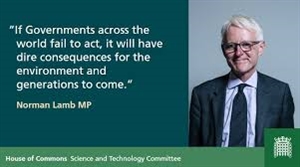MPs Committee says achieving clean growth may not be compatible with personal vehicle ownership
Thu 22 August 2019
View all news

Amongst the recommendations of the Science and Technology Committee's report on the technologies needed to achieve clean growth are that the Government must end the fuel duty freeze, reconsider fiscal incentives for cleaner vehicles and bring forward the ending of sales of new 'conventional' cars and vans to 2035 at the latest.
The MPs' report also acknowledges evidence provided by the LowCVP on the importance of considering emissions over the full life cycle of vehicles (and fuels) It says that Government should not aim to achieve emission reductions simply by replacing existing vehicles with lower emission versions and that "in the long term, widespread personal vehicle ownership therefore does not appear to be compatible with significant decarbonisation".
In its introduction, the Committee welcomes the Government’s 'net zero' decision to strengthen its long-term emissions reduction target, to effectively eliminate all emissions by 2050.
The Committee identifies ten key areas in which Government policy to support the implementation of low carbon technology has been delayed, cut back or undermined carbon reductions. In terms of road transport the Committee is highlights that:
-
The 'plug-in grant' for low-emissions cars was reduced for the lowest-emissions cars in October 2018, and cut completely for other low-emissions cars.
-
Fuel duty has been frozen for nine years in a row, while bus and train fares have been allowed to increase every year over the same period.
The Committee makes ten recommendations for change including a plan for reducing vehicle emissions. It says that the Government must bring forward the date of its proposed ban on the sales of new ‘conventional’ cars and vans to 2035 at the latest, and ensure that it covers hybrids too.
In the near-term, it says, the Government must reconsider the fiscal incentives for consumers to purchase both new and used vehicle models with lower emissions. The Government should also work with public services and owners of public land, such as schools and hospitals, to accelerate the deployment of electric vehicle chargepoints, and introduce measures to ensure that chargepoints are interoperable, compatible with a smart energy system, reliable, and provide real-time information on their current functionality.
Although ultra-low emissions vehicles generate few emissions during use, the report says, their manufacture generates substantial emissions. In the long-term, widespread personal vehicle ownership therefore does not appear to be compatible with significant decarbonisation.
the report says that the Government should not aim to achieve emissions reductions simply by replacing existing vehicles with lower-emissions versions.
Chair of the Science and Technology Committee, Norman Lamb MP said: “Throughout our inquiry, it was worrying to hear that although the Government may be ambitious when it comes to reducing carbon emissions, it is not putting the policies in place which are needed to achieve those targets.
"We need to see the Government put its words into actions.
"The scale of the challenge cannot be underestimated.This Report clearly highlights ten key areas of concern and we hope the Government listens to our realistic, achievable recommendations on how to make the UK a world leader in cutting carbon emissions once again.”
The select committee report also quotes LowCVP oral evidence in saying: “(In the long term) We need to deliver a (zero) mobility system not a fleet of vehicles”.
Related news: Bright Blue, the 'independent think tank and pressure group for liberal conservatism', has released a new report focusing on air quality - '
Emission impossible' - which also calls on the Government to end the fuel duty freeze. Amongst 15 policy recommendations it calls on Government to "Lift the freeze on the value of Fuel Duty and apply a surcharge on Fuel Duty for diesel fuel (a ‘Diesel Duty’)". The report also calls for an exemption for Ultra Low Emission Vehicles (ULEVs) from VAT.
Related Links
< Back to news list